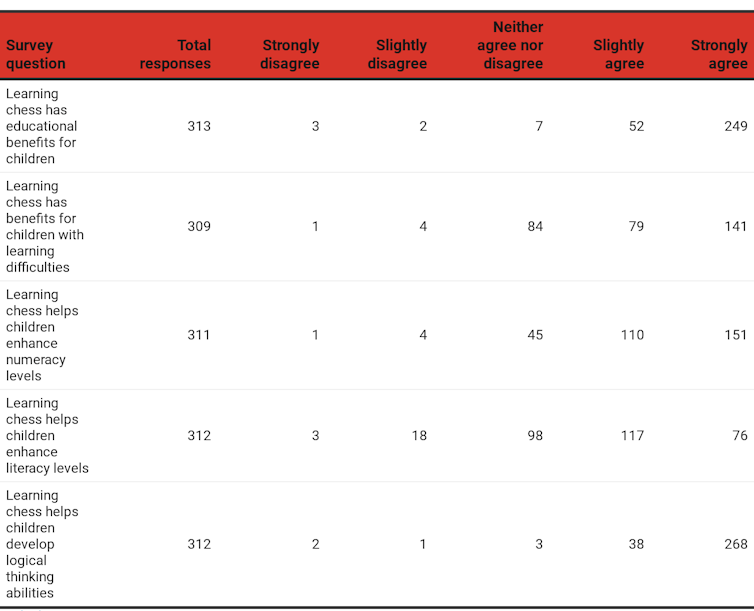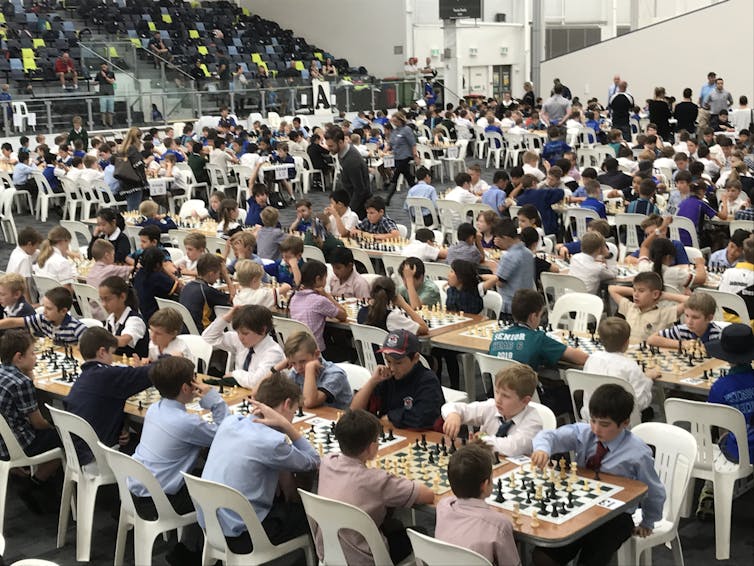Most people think playing chess makes you 'smarter', but the evidence isn't clear on that
- Written by Graeme Gardiner, PhD Student, University of Southern Queensland
Chess has long been an important part of school culture. Many people believe chess has a range of cognitive benefits including improved memory, IQ, problem solving skills and concentration.
But there is very little evidence supporting these conclusions. We conducted two studies (still unpublished) that found educators and parents believe chess has many educational benefits. But children in our study who played chess did not show significant improvements in standardised test scores compared to children who didn’t play.
Read more: If machines can beat us at games, does it make them more intelligent than us?
Most people think chess improves learning
The first study looked at the perceptions of educators and parents regarding the benefits of playing chess.
In 2016, 314 participants – which included school principals, teachers, chess-coordinators and parents in parts of Queensland and NSW – filled out an anonymous, online survey.
Participants were asked to state how much they agreed or disagreed with 34 statements about the benefits of playing chess, such as: learning chess helps children develop critical thinking abilities.
Most participants either agreed or strongly agreed with most of the statements for chess benefits. For instance, almost 80% (249 out of 313) strongly agreed learning chess had educational benefits for children.
Another 87% (269 out of 310) strongly agreed learning chess helps children develop problem solving abilities. And 59% (184 out of 314) strongly agreed learning chess has benefits for Indigenous and Torres Strait Islander Children.
 Some questions in the survey and the answers given by participants.
Some questions in the survey and the answers given by participants.
The survey also included a space for comments. Some comments from participants included:
Chess is a great activity for all children to be involved in. It is one of a number of activities that schools can offer that assist in the academic, social and emotional development of children.
One parent said:
Since starting classes [my son] has become a full-time student and is managing social situations a lot better than before. Chess has pushed him to think in different ways.
But does it?
Previous studies that explored whether chess improves children’s cognitive abilities have had mixed results.
Some studies have found playing chess was linked to better thinking abilities. For instance, a significant 2012 New York study found that children in a group that had learnt either chess or music performed slightly better than children in the group who learnt neither.
But the study also noted the improvement in the chess group was not statistically significant.
Read more: How to use music to fine tune your child for school
A 2017 trial of more than 4,000 children in England found no evidence that chess instruction had any effect on children’s mathematics, reading or science test scores.
We wanted to test if there was, in fact, a positive correlation between learning to play chess and learners’ verbal, numerical and abstract (visual) reasoning skills. The study explored this in Year 1 to Year 5 students in a private school in Queensland.
In particular, the study examined whether a range of chess-related and non-chess related variables affected the standardised test scores of the chess group as compared to the control groups.
The study consisted of 203 students (with approval of their parents) who opted into the study. They made up four groups (based on the same approach as the 2012 New York study mentioned above). The groups were made of:
- 46 students who learnt to play chess
- 48 students who learnt to play music
- 37 students who learnt to play chess and music
- 72 students who neither learnt chess nor music
Weekly chess lessons were given to 83 students for six months: 24 from Year 1, 20 from Year 2, 8 from Year 3, 18 from Year 4 and 13 from year 5.
Weekly music lessons were given to 85 students for six months: 16 from year 1, 15 from year 2, 12 from year 3, 23 from year 4 and 19 from year 5.
 Many schools have chess programs, and there are state and nation wide competitions.
Author provided
Many schools have chess programs, and there are state and nation wide competitions.
Author provided
We used standardised tests to measure whether there was any significant change in the scores of the different groups.
Year 1 and 2 students were tested using the Raven’s Progressive Matrices (RPM) tests, which are multiple-choice intelligence tests of abstract reasoning.
Grade 3, 4 and 5 students were tested using the ACER (Australian Council of Educational Research) General Ability Tests (AGAT), used to assess learners’ reasoning skills in three areas: verbal, numerical and abstract (visual).
There were small improvements in the standardised test scores of the chess and music groups but these were not statistically significant.
Read more: A good move to master maths? Check out these chess puzzles
Our findings don’t mean learning to play chess has no benefits for cognitive skills. There are many different types of thinking and measures of intelligence we do not yet fully understand. This is especially relevant in a world where conceptual thinking has become such a vital skill.
The different ways of thinking associated with the benefits of chess may include creative thinking, critical thinking, logical thinking, intuition, logical reasoning, systemic thinking, strategic thinking, foresight, convergent thinking, analytical thinking, problem solving and concentration.
Further research should aim to explore which type of thinking chess may improve, if we are to agree with the positive views of academics, educators, parents and players.
Authors: Graeme Gardiner, PhD Student, University of Southern Queensland



















